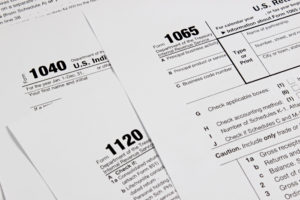Focus on New York

In honor of solidarity and the fact that our hearts go out to the many New Yorkers who have lost their lives in the COVID-19 pandemic, we decided to focus this month’s State of the Month on the Northeast state of New York. It was one of the original 13 colonies that formed the United States. It is the fourth most populous state and is the 27th largest. The state and city (New York City) were both named for the 17th-century Duke of York, the future King James II of England. New York City is a global city home to the United Nations Headquarters, and has been described as the cultural, financial, and media capital of the world, as well as the world’s most economically powerful city.
What You Need to Know About COVID-19 Federal Tax Relief
 Over the last three months, COVID-19 has grown to affect almost every aspect of daily life. From shelter-in-place mandates to the millions of workers currently out of work, we've all felt the impact.
Over the last three months, COVID-19 has grown to affect almost every aspect of daily life. From shelter-in-place mandates to the millions of workers currently out of work, we've all felt the impact.
As a small business ourselves, we understand that this is a time of financial crisis for so many similarly-sized businesses across the country. If you are a small business owner looking for answers, please keep an eye on this blog. We will continue to provide you with in-depth analysis of the changing situation and what it means for you and your business.
So far, we've provided a look at COVID-19 related state tax relief and what state taxes may look like after the crisis subsides. (Check out our recent blog on some sales tax relief being offered by the state of California.) We'll now dive into federal tax relief and how you can expect to be impacted.
The CARES Act, signed into law by President Trump on March 27, offers $2.1 trillion in aid to individuals and businesses.
As part of the act, employers may claim a 50 percent tax credit on the first $10,000 of qualified wages paid to employees from March 13 to December 31, 2020. Qualified wages include wages of employees who were either furloughed or whose hours have been reduced due to COVID-19.
Employers must either experience a full or partial suspension due to governmental actions related to COVID-19, or experience a 50 percent decline in gross receipts during a calendar quarter when compared to the same quarter in the previous year.
For businesses with over 100 employees, the credit can only be applied towards payroll of employees who are unable to work due to a business suspension, or lack of business.
However, it's important to note that employers may not receive the above tax credit if they participate in the Paycheck Protection Program, as outlined below.
Also, under the CARES Act, $349 billion in COVID-19 relief funds have been set aside for small businesses.
As of April 3, small businesses and sole proprietorships can apply for and receive forgivable loans in order to meet payroll and certain other expenses through an existing SBA lender. Independent contractors and self-employed individuals will be able to apply for the same program starting April 10.
According to the U.S. Department of the Treasury, all businesses, including nonprofits, veterans' organizations and Tribal business concerns with 500 or fewer employees can apply. In certain industries, businesses with more than 500 employees will be able to apply if they meet SBA employee-based size standards.
The program is open until June 30, so it's important to begin the application process as soon as possible. To apply, you will need to complete the Paycheck Protection Program loan application and submit it with required documentation to an approved lender that can process your application by June 30.
The Treasury Department has said funds from these loans can be used towards:
- Payroll costs, including benefits
- Interest on mortgage obligations, incurred before February 15, 2020
- Rent, under lease agreements in force before February 15, 2020
- Utilities, for which service began before February 15, 2020
Loan amounts are applicable for forgiveness as long as the funds are only used to cover payroll costs, mortgage interest, rent and utility costs over the eight-week period the loan is made, AND if employee and compensation levels are maintained. At this point, it is anticipated that not more than 25 percent of the forgiven amount may be for non-payroll costs.
More information on the size of available loans and forgiveness can be found on the Treasury Department website.
Note that as we've been researching this program and speaking to bankers, a few nuances come to light. If you bank with a large institution (Bank of America, Chase, and Wells Fargo, to name a few), you must generally apply online and the determination of funding is not made at the branch level. Also, most banks recommend that you first apply with the bank you generally use for checking or other lending. Because of the high demand for these loans, banks are expected to cater to their existing customers first.
As small business too, we are particularly interested in the PPP loan as it provides short term funding for payroll and rent, and as mentioned above, is likely to be largely forgivable.
As the economic impact of COVID-19 continues to evolve, we are keeping track of daily updates and will keep you informed.
If you have specific questions about COVID-19 federal tax relief, CARES or the Paycheck Protection Program, and of course, state tax matters, please contact us today and we can clarify any aspects you're trying to navigate.
In the meantime, from the Miles Consulting family to yours, we wish you continued safety and health during these turbulent times.
California and Sales/Use Tax in These Challenging Times

In these challenging times we are all looking for help in so many ways.
So, we are pleased to share some good news for California businesses required to file sales and use tax returns.
On April 2nd, the State of California announced that it is providing the following COVID-19 sales and use tax relief:
State Tax After Crisis—The Long View

By now most, if not all of us, have had some change in their
life and daily routine as a result of the Covid-19 pandemic. While many of us
have lived through several national crises, during the course of my life, there
has been nothing quite like this. I
suspect that there could be more dramatic changes to come and we can only hope
and pray that the loss of life seen in other parts of the world do not happen
here.
Please indulge me as I reminisce a little. I started my career in 1984, which was just
as the country and the world started coming out of a recession. As a young staff, I saw the Savings and Loan
crisis resulting in the failure of almost 1/3 of the nation’s savings and loans
during 1988 – 1995. In February of 2000,
I moved to San Jose, California, just in time for the start of another
recession that resulted in the collapse of the dot-com bubble. That next year our country experienced the 9/11
attack. Then in late 2007 through June
of 2009 we had the “Great Recession” as a result of the subprime mortgage crisis. Thankfully, since then we have been fortunate
to enjoy a strong economy and seen growth worldwide. Many of those working today have never experienced
a true economic downturn or recession.
For the most part, the 2010’s were good.
State Tax Filing Relief Due to COVID-19

As COVID-19 continues to disrupt businesses all across the
US (and the world), we are all still trying to understand the multiple challenges
which will arise and how states will respond. Miles Consulting and our team are
here to provide you with the latest updates and facts regarding the changing
tax implications and to guide you through some relief provisions declared by
states. Some clients have reached out to us with questions regarding extensions
for filing returns, updated filing dates and requirements to waive late
payments. As we find out, we’ll let you know as soon as we can, recognizing
that it’s a continual moving target!
What You Need To Know About Marketplace Facilitator Legislation

As the digital economy continues to expand and online shopping becomes the norm, marketplace facilitator legislation has already been implemented by a number of states across the country. Of those states that don’t currently have marketplace facilitator legislation, many are in the process of implementing it.
The laws that are currently enacted vary on a state by state basis, which has created confusion for sellers and marketplaces alike. As a result, there have been a number of marketplace facilitators that have appealed to state courts regarding the legislation.
What is a Marketplace Facilitator?
So what exactly is a marketplace facilitator? As explained by Avalara, a marketplace facilitator is an online marketplace, such as Amazon, Etsy or Walmart, which facilitates the sale of goods from third-party sellers. Companies who sell through marketplaces are able to reach a much larger audience than if they only sold through their own websites. What we are seeing with our own client base is that many more companies are marketplace facilitators than the initial legislation seemed to target. And, because there are many creative ways to sell products, it is actually sometime unclear if a company is a marketplace facilitator, which adds some challenge for online sellers.
What Does Marketplace Facilitator Legislation Target?
When a state or other municipality implements marketplace facilitator legislation, it is to require them, rather than the marketplace seller, to manage the collection and remittance of sales and use tax on behalf of their sellers. The main motivation for these laws is to reduce the amount of sales tax dollars that go uncollected, as well as easing the burden on states when handling sales tax returns. Specifically, it is easier to handle collections and sales tax returns from several large companies than having to manage many small returns from marketplace sellers.
Dissent from Marketplace Facilitators
As a result of marketplace facilitator legislation, many companies are going to court in an attempt to challenge these laws.
In a recent case, Walmart Inc. appealed to the Louisiana Supreme Court, and won its case that they are not a “dealer” obligated to remit sales tax on products sold by third-party sellers on its website. As a result of this decision, the burden of remitting sale tax falls to the third-party sellers that make sales through Walmart.com.
This outcome is in direct contrast to a 2019 case that saw Amazon filing a lawsuit against the South Carolina Department of Revenue after being handed a bill for approx. $12.5 million in unpaid sales tax, interest and penalties. In September 2019, a South Carolina judge ruled in favor of South Carolina, disagreeing with Amazon’s view that marketplace sellers were liable for the tax.
What Does the Future of Marketplace Facilitation Look Like?
It’s hard to say what 2020 may hold for marketplace facilitator legislation. As states continue to implement laws and legal battles are held, changes may come very quickly. A consensus between states in order to reduce the burden of remitting sales tax may yet come, though there has not been significant progress made on that front.
Regardless, as stated by Digital Commerse 360, there’s a good reason that states are continuing to implement and fight for this type of legislation: the laws generate significant revenue.
Do You Still Have Questions?
Do you want to know more about marketplace facilitation and how it may affect your business? We’d love to answer your questions! Contact us today and we can clarify any multi-state tax issues you’re trying to navigate.
In These Challenging Times...

Dear Friends,
You may have
noticed that we have not yet hit your in-box with a message about the Miles
Consulting response to the COVID-19 pandemic.
We purposely didn’t want to send out yet another message about washing
hands, staying 6 feet away from people, or working from home. It’s not that we aren’t sensitive to these
matters. It just felt like some
companies were sending out notices just to send something out. In the past few days, I’ve come to realize
that while this situation has physically required us to stay away from contact
with people, my network does want to interact – in fact, very much so. And I do too!
So, it is in that spirit that we now post this blog with some
information about how we may be of service during this time.
How To Keep Yourself Safe From Qui Tam Lawsuits

In the time since the 2018 Wayfair decision, dozens of states across the U.S. have passed economic nexus legislation. These laws compel out-of-state retailers with no physical presence to remit sales tax once they meet the state’s minimum economic nexus requirements.
A year and a half later, the complexity of the new legislation is creating headaches for businesses all over the country.
Even worse is the undeniable fact that the added complexity is opening up companies to the additional risk of Qui Tam lawsuits from whistleblowers.
What is a Qui Tam Lawsuit?
A Qui Tam lawsuit is brought forward under the False Claims Act (FCA), which alleges a business committed fraudulent behavior that impacted governmental programs. These suits are filed on behalf of the government by an individual (the whistleblower) in exchange for a portion of the recovery (generally 15 to 25 percent).
There has been an increasing popularity in FCA cases since 2009, when the average instance of Qui Tam cases rose by nearly double. In 2019 alone, the government recovered over $2.1 billion from Qui Tam suits brought forward by whistleblowers.
Qui Tam actions sometimes include charges of improper sales and use tax collection; the Wayfair decision increased opportunities for such cases.
How To Protect Your Business From Qui Tam Lawsuits
The first step to keep your business safe from Qui Tam lawsuits is to ensure you are taking the proper precautions. To start, do your research and speak with a state tax specialist like Miles Consulting Group to make sure you’re following all applicable tax laws.
A Qui Tam suit generally requires a “scienter” violation, which means that an honest mistake usually isn’t enough for a whistleblower to move forward with a suit. However, acting in deliberate ignorance or in ‘reckless disregard of the truth’ would qualify as a scienter violation. That’s why making sure you do your homework and understand how economic nexus legislation may apply to your company is so important to protecting your business.
Once you have a handle on what applies to you, we recommend creating a response plan, just in case you ever find yourself facing a Qui Tam lawsuit. This is especially important as the time you have to respond to the suit can be as little as 20 days, depending on your state.
This plan should include immediately contacting a trusted adviser, such as a tax lawyer. Also, consider what your response would be ahead of time (whether you would fight the claim or settle) so you don’t need to make big decisions in the heat of the moment without taking all the facts into consideration.
Overall, as the ramifications of the Wayfair decision continue to play out, protecting your business by continuing to identify potential online sales tax issues is increasingly important.
Do You Still Have Questions?
Do you want to know more about how you can protect your business from Qui Tam lawsuits? We’d love to answer your questions! Contact us today and we can clarify any multi-state tax issues you’re trying to navigate.
Focus on Washington D.C.

We were in the intermountain west last month, but let’s now
take a journey to our nation’s capital. Founded after the American Revolution
as the seat of government of the newly independent county, Washington D.C. was
named after George Washington, the first president of the United States and a
founding father of our nation. As the seat of the United States federal
government and several international organizations, Washington is an important
world political capital. The city, located on the Potomac River, bordering
Maryland and Virginia, is one of the most visited cities in the world, with
more than 20 million tourists annually.
How Is The Golden State's Cannabis State Tax Revenue Used?

Four years ago, California legalized recreational marijuana use and began collecting state tax on cannabis transactions. As we’ve previously explained, the Golden State laid out the following requirements for taxing marijuana:
- Standard state sales and use tax
- A 15 percent excise tax on retail purchasers of cannabis and cannabis products
- A tax on all harvested cannabis that enters the commercial market with rates ranging from $1.29 to $9.25 per ounce (depending if the harvest is flowers, leaves or a fresh plant)
- Local business taxes in some cities, sometimes as high as 15 percent
How Is California Using The Revenue Generated From This State Tax?
Leafly reports $635 million paid to California in state and local cannabis tax revenue in 2019: about $538 million to the state and $100 million to local sales tax coffers. Most of the funds went towards:
- Youth anti-drug programs (60 percent)
- The environment (20 percent)
- Public safety grants (20 percent)
Within these categories, programs receiving the revenue include (from most to least amount of funds received):
- Low-income children in child care
- Police and fire departments in cities with dispensaries
- Combatting illegal grows/encouraging wild land restoration
- At-risk youth
- Community reinvestment grants for social workers
- Safer roads
- Licensing and regulation for the cannabis industry
- Cannabis science and policy research
- Parks, etc.
What’s On The Horizon For California’s Cannabis State Taxes?
Despite the state’s ability to increase the revenue to these types of programs, annual cannabis sales are much lower than anticipated. Some believe it’s due to the complicated taxes and others cite California’s stringent regulations.
In an effort to increase the revenue from the state tax, Governor Newsom announced multiple provisions in the Golden State’s annual budget that would simplify the industry’s tax structure:
- Combine the current three licensing entities (the Bureau of Cannabis Control, the Department of Public Health, and the Department of Food and Agriculture) into one agency: the Department of Cannabis Control
- Shift the state tax collection responsibility to different parties along the supply chain; this would reduce how often the California Department of Tax and Fee Administration would need to adjust the markup rate (it’s currently every six months)
- Instead of the final distributor collecting and remitting the cultivation excise tax, the first distributor would be responsible for the state tax
- Make the retail excise tax the retailer’s responsibility rather than the distributor
- Lowering existing state taxes to encourage residents to purchase recreational cannabis legally
It will be interesting to see if Newsom’s proposals are passed and, if so, how they affect revenue collected from the cannabis industry’s state taxes.
Contact Us To Learn More!
Do want to learn more about the cannabis industry and how it may affect your business? Contact us today to find out how we might be able to help with this or any other multi-state tax issues your company may be facing.





















